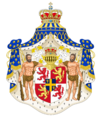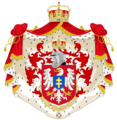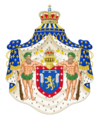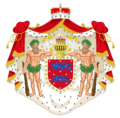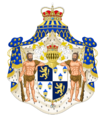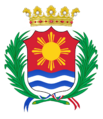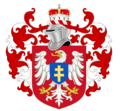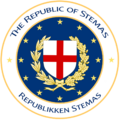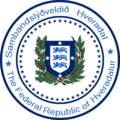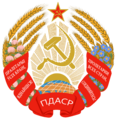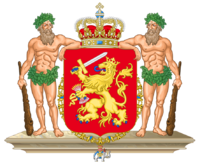Heraldry of Ahrana: Difference between revisions
No edit summary |
|||
| Line 47: | Line 47: | ||
The [[House of Eriksson]] is related to the [[House of Chayka|House of Mishia-Chayka]] through a relative that was the son of a King from the Imperial House. Today the House of Eriksson has been elevated back to Princely Status, the House is headed by Princess Madeleine Eriksson. | The [[House of Eriksson]] is related to the [[House of Chayka|House of Mishia-Chayka]] through a relative that was the son of a King from the Imperial House. Today the House of Eriksson has been elevated back to Princely Status, the House is headed by Princess Madeleine Eriksson. | ||
Today, the only Houses to bear the Sheild of the [[House of Olaf]] are those of the Imperial Family. The Heraldic Rules created in Ahrana during the era of the first creation of Heraldry states: | |||
''Only those of the Imperial Bloodline may bear the Sheild of the Empire of Ahrana and of the House of Olaf. The decendents of the House of Olaf are the only Houses allowed to bear the Anicent Shield. Those outside of the Imperial House of Olaf may have the Strongman Heraldic Supporter on the sides of the full Coat of Arms display.'' | |||
Today only two Imperial Houses openly display the Imperial Sheild of the [[House of Olaf]], the [[House of Chayka|House of Mishia-Chayka]] and the [[House of Florence|House of Florence-Goring]], no other Royal or Noble House may bear the Olaf Sheild unless they are true decendents of the Imperial Bloodline. | |||
<gallery> | <gallery> | ||
House of Kovach-Zydik COA.png|''Greater Coat of Arms of the [[House of Kovach-Zydik]] | House of Kovach-Zydik COA.png|''Greater Coat of Arms of the [[House of Kovach-Zydik]] | ||
Revision as of 04:27, 22 March 2023
| Greater coat of arms of Ahrana | |
|---|---|
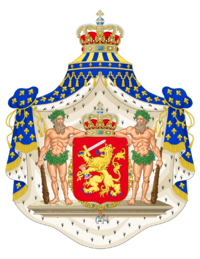 Greater (royal) version | |
| Versions | |
 Middle version | |
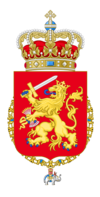 Lesser (state) version | |
| Armiger | Sigrid A. A. V Florence Aleksandra V. A. M. Chayka II |
| Adopted | 1 July 2020 |
| Crest | Crown of the Imperial Household |
| Torse | tasseled strings Or |
| Blazon | Gules lion with a coronet Or armed and langued Azure holding in his dexter paw a sword Argent hilted Or and in the sinister paw seven arrows Argent pointed and bound together Or |
| Supporters | two wild men armed with clubs proper |
| Compartment | pedestal |
| Orders | Order of the Elefant |
| Other elements | The monarch places this coat of arms on a mantle Azure with Fleur de Lys lined with Ermine. Above the mantle is a pavilion gules again topped with the royal crown. |
The Coat of Arms of Ahrana has three total versions that are used throughout all Government offices at the Federal Level, Greater, Middle, and Lesser Versions. As Ahrana is a Confederation of States the Federal Coat of Arms takes precedence over the Member States Coat of Arms or Emblems whichever the Member State have in use.
Royal Coat of Arms
The Royal Coat of Arms are classified into two categories, the Royal or Federal Coat of Arms and the Imperial House Coat of Arms. Within these two categories the most commonly used Coat of Arms is the Royal or Federal Coat of Arms which is even typically used by the Diarchs as the official Coat of Arms of use. However, the House of Chayka and the Hosue of Florence-Goring have their own personal Coat of Arms that has been used since the inception of the Royal Houses originally.
Imperial House Coat of Arms
The Imperial House is made up of two of the last remaining Imperial or Royal Houses of Ahrana, House of Mishia-Chayka and House of Florence-Goring. The House of Mishia-Chayka is the Senior House of the two Houses but holds no special privileges, both Imperial Houses are given the same amount of respect due to the fact they are the last remaining Royal Houses that can and are able to trace their lineage back to the House of Olaf during the time of the Empire of Ahrana.
Greater Coat of Arms of the House of Mishia (Now extint)
Greater Coat of Arms of the House of Mishia-Chayka
Greater Coat of Arms of the House of Florence-Goring
Other Royal/Noble House Coat of Arms
Currently there are two Noble Houses in Ahrana that are connected to one of the two Imperial Houses, House of Bjorkman and the House of Eriksson. The House of Kovach-Zydik is connected to the House of Mishia-Chayka and by birthright is a decendent of the House of Mishia. The House of Asplund was a Royal House in the Kingdom of Uppsund before the last Queen of Uppsund reposed wihtout leaving any heirs behind. the House of Asplund was connected to the House of Florence-Goring and the House of Mishia-Chayka through the Crown Prince of Ahrana, Prince Markus Felix Chayka Asplund.
The House of Eriksson is related to the House of Mishia-Chayka through a relative that was the son of a King from the Imperial House. Today the House of Eriksson has been elevated back to Princely Status, the House is headed by Princess Madeleine Eriksson.
Today, the only Houses to bear the Sheild of the House of Olaf are those of the Imperial Family. The Heraldic Rules created in Ahrana during the era of the first creation of Heraldry states: Only those of the Imperial Bloodline may bear the Sheild of the Empire of Ahrana and of the House of Olaf. The decendents of the House of Olaf are the only Houses allowed to bear the Anicent Shield. Those outside of the Imperial House of Olaf may have the Strongman Heraldic Supporter on the sides of the full Coat of Arms display. Today only two Imperial Houses openly display the Imperial Sheild of the House of Olaf, the House of Mishia-Chayka and the House of Florence-Goring, no other Royal or Noble House may bear the Olaf Sheild unless they are true decendents of the Imperial Bloodline.
Greater Coat of Arms of the House of Kovach-Zydik
Greater Coat of Arms of the House of Asplund (Uppsund)
Greater Coat of Arms of the House of Bjorkman
Greater Coat of Arms of the House of Eriksson
Coat of Arms of the House of Olaf
Member State Coat of Arms
The Coat of Arms of the Full Member States typically follow the same style with a golden wreath with the Member States Regional Sheild in the middle crowned by the Royal Ahranaian Crown. The only exception to this style are the Coat of Arms of Dukedom of Thralhaven and United Provinces of South Dniester as those Regional Government picked different Coat of Arms to use.
Protectorate State Coat of Arms/Emblems
The Union of Ahrana also has special status of states called Protectorate States who either enjoy full Member State rights or Special Rights with the Union. Currently the Protectorate States are, the Republic of Stemas, the Federal Republic of Hveradalur, the Grand Duchy of Volhynia, and the United Socialist Republic of North Dniester.





